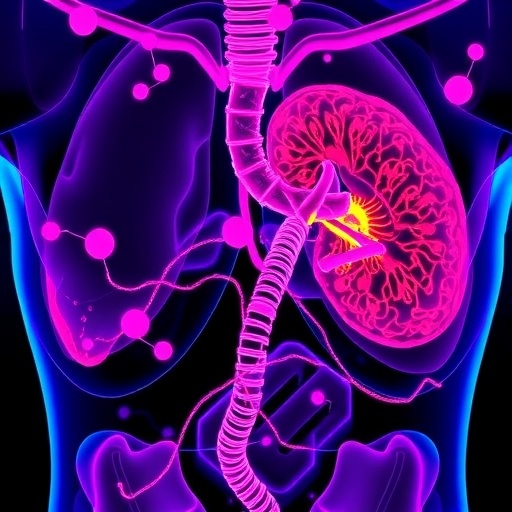In a groundbreaking study published in the Journal of Translational Medicine, researchers have unveiled a significant advancement in understanding prostate cancer through the lens of lactylation. This research, initiated by Zou, Jin, and Zhang, explores the construction of a novel lactylation risk signature (LA risk signature) in prostate cancer utilizing cutting-edge 4D fast data-independent acquisition (DIA) L-lactated quantitative genomics. The implications of their findings could revolutionize how prostate cancer is diagnosed and treated, informing both clinical practices and research methodologies.
Prostate cancer remains one of the most prevalent malignancies among men worldwide. Researchers and clinicians have long sought methods to enhance early detection and improve therapeutic strategies. The introduction of lactylation as a potential biomarker means that practitioners could better stratify patients, allowing for more tailored treatment approaches. The study’s pioneering use of 4D data-independent acquisition techniques presents an innovative lens through which to analyze complex biological interactions, thereby offering deeper insights into cancer pathogenesis.
Lactylation, a relatively novel post-translational modification, has garnered attention for its role in various diseases, including cancer. Prior to this study, the implications of lactylation in prostate cancer were largely unexplored. The researchers meticulously examined the metabolic and pathological pathways connected to lactylation, revealing key relationships that could lead to new therapeutic targets. Their approach highlights a holistic view of tumor biology that transcends traditional genetic analyses.
The methodology employed in this study is equally noteworthy. By utilizing 4D fast DIA, the researchers were able to collect comprehensive data regarding lactylation patterns across prostate cancer samples with remarkable specificity. This multi-dimensional approach facilitated a clearer understanding of how lactate metabolism might influence tumor behavior. Additionally, the study employs advanced bioinformatics tools for data interpretation, ensuring that the findings are robust and scientifically valid.
In their results, the authors identified a distinct lactylation signature that correlates with various clinical outcomes in prostate cancer patients. This correlation suggests that lactylation could serve as a prognostic indicator, guiding healthcare providers in making more informed decisions regarding patient management. Such a signature may not only aid in early detection but could also tailor therapeutic approaches based on individual lactylation profiles.
Further analysis within the study revealed multiple signaling pathways influenced by lactylation. By mapping these pathways, the researchers established a framework through which other scientists can investigate how metabolic changes can alter cellular functions, potentially leading to cancer progression. This framework opens new avenues for research focused on reversing metabolic dysregulation in cancer cells, paving the way for novel intervention strategies that could halt or even reverse tumor growth.
The implications of this research extend beyond merely understanding prostate cancer. The study underscores the necessity of interdisciplinary approaches in cancer research, merging genomics with metabolomics and bioinformatics to create a more integrated view of disease. This could set a precedent for similar studies in other malignancies, fostering a comprehensive understanding of how metabolic alterations influence various cancers.
Interestingly, the study also points to lactylation as a potential therapeutic target. By understanding the mechanisms through which lactylation affects tumor behavior, researchers may be able to develop drugs that specifically modulate this modification. This could add a new dimension to cancer treatment, where therapies are designed to either inhibit or enhance lactylation depending on the needs of the patient.
Moreover, the researchers underscored the importance of using a large cohort for their analysis, which greatly enhances the reliability of the risk signature developed. The diverse patient backgrounds and stages of disease encompassed in the study provide a more accurate representation of the general prostate cancer population. This emphasizes the need for ample sample sizes in cancer research to ensure findings are applicable to a broader demographic.
The study aligns with the growing trend of utilizing precision medicine in oncology, where treatments are personalized based on individual characteristics. The development of the lactylation risk signature exemplifies how molecular insights can translate into actionable clinical strategies, ultimately aiming to improve patient outcomes in a population that traditionally struggles with late-stage diagnoses.
Importantly, the research continually advocates for ongoing explorations into other post-translational modifications, fostering a paradigm that could augment our understanding of cancer biology. By situating lactylation within the broader spectrum of metabolic research, this study paves the way for future discoveries that might further elucidate the complex interplay between metabolism and cancer.
It is also noteworthy that this work is a collaborative effort, involving various fields of expertise ranging from oncology to computational biology. Such collaborations are crucial, as they catalyze innovation and drive significant advancements in research methodologies and clinical applications. It serves as a robust model for future interdisciplinary projects aimed at tackling complex health issues.
In conclusion, the insights derived from this research position lactylation not just as a biomarker but as a central player in the cancer biology narrative. As focus continues to shift towards personalized therapies, the formation of the lactylation risk signature could spark vital changes in how prostate cancer is approached clinically. Overall, this study marks a notable step in the evolution of cancer research and signifies the profound impact innovative genomics can have in shaping future medical paradigms.
Subject of Research: Lactylation risk signature in prostate cancer
Article Title: Construction of lactylation (LA) risk signature in prostate cancer based on 4D fast DIA L-lactated quantitative genomics.
Article References:
Zou, F., Jin, Y., Zhang, Z. et al. Construction of lactylation (LA) risk signature in prostate cancer based on 4D fast DIA L-lactated quantitative genomics.
J Transl Med 23, 967 (2025). https://doi.org/10.1186/s12967-025-06990-6
Image Credits: AI Generated
DOI:
Keywords: Prostate cancer, lactylation, risk signature, 4D fast DIA, genomics, precision medicine, metabolic dysregulation, post-translational modifications, cancer biology.




